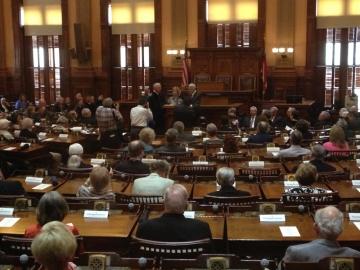
Section Branding
Header Content
Thompson: Reforms Are Working
Primary Content

Georgia’s new top judge says the state is already seeing the benefits of several years of criminal justice reform.
Hugh Thompson took over as the Georgia Supreme Court’s chief justice in August. He said in an interview with GPB the adult prison population is stabilizing.
“The end result of that is that we remediate problems for people who are in the system. We take them out of the likelihood that they will reoffend, and that way, we not only help them, we also help society as well, because make it a safer place for all of us to live,” Thompson said.
He also said he’s keenly interested in following the juvenile justice reforms the General Assembly enacted earlier this year. Both sets of reforms divert low-level offenders to community-based programs or alternative courts, like drug courts, while still locking up the most dangerous criminals.
Thompson also said one of his top priorities will be working to make sure people from all backgrounds have equal access to the courts. He said the state’s court system needs more interpreters to make sure all residents have that access.
“We have a very diverse population,” he said. “We have many, many groups, many languages representing the population of Georgia. And in order to have fair access to the courts, we have to ensure that we have interpreters, for example, in place in all areas.”
The problem is the variety of languages people speak in Georgia and the remoteness of some rural areas.
The federal government put all states on notice two years ago that courts must provide free interpreters to criminal defendants who cannot afford them as well as to people involved in civil cases.
Thompson said he will also be focused on ensuring the state’s courts have the resources they need to deal with a growing population and ever-increasing caseload.
To that end, the Judicial Council of Georgia recommended Friday the governor and General Assembly approve two new superior court judgeships.
The council gave top priority to the Coweta Circuit, which includes five counties in west Georgia. The judges also want a new position in the Waycross Circuit in southeast Georgia.
Thompson said the state is short 14 or 15 superior court judges overall.
“If we don’t have adequate courts, if we don’t have adequate resources to fund the courts, then we’re going to delay all sorts of justice,” Thompson said. “It’s not good for commerce. It’s not good for business. It’s not good for jobs.”
Thompson says the governor and lawmakers have done the best they could in tough times.
Tags: General Assembly, Georgia Supreme Court, Superior Court Judge, Supreme Court, judges, juvenile justice, criminal justice reform, criminal justice, adult criminal justice, juvenile justice reform, Chief Justice Hugh Thompson, forfeiture laws, Hugh Thompson
